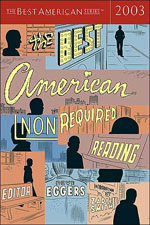[Transcribed discussion of “The Trolls Among Us,” by Mattathias Schwartz, published in The New York Times Magazine.
This article focuses on a burgeoning Internet subculture populated by people called trolls. “Troll” arose in the late 1980s as a description for anyone “who intentionally disrupts online communities.” Back then, writes Schwartz, trolling was innocuous, no more than the occasional asinine question posted on a message board. These days, however, trolls are craftier and more powerful. Schwartz opens the story with an example: after a seventh-grader named Mitchell Henderson shot himself, his friends created a MySpace page in his memory. The details of Henderson’s death eventually got posted on /b/, a message board known for its graphic and insulting posts. Henderson’s story then caught the attention of trolls who frequent the site. The boy’s face started appearing all over the net, even appended collage-style over actors’ faces in hardcore porn flicks. People took pictures at his gravesite and posted them online. Someone claiming to be “Mitchell’s ghost” prank called his parents. “The front door is locked,” the caller told Henderson’s dad. “Can you come down and let me in?”]
Joseph: I’ve heard of this kind of thing happening. Actually something like this happened to someone at my school. Someone hacked into his MySpace page and really messed with it.
Molly: You can do that?
Joseph: I think it’s pretty easy to do, actually.
Bora: At my school someone created a Facebook account for this one teacher we had. It made fun of him. This teacher was the kind of guy you did not want to mess with. There was this big meeting in the school auditorium and he stood up and said, “This is harassment,” and threatened to call the police. But they never found out who did it. That’s kind of troll-ish, isn’t it?
Joseph: I would say so. That’s why I found this article interesting. Because this stuff has happened to people I know. I’ve seen it happening.
Javier: Yeah, I liked this article a lot. But I had never heard of this. So I learned a lot from it.
[The students were asked whether they have any sympathy for the trolls]
Javier: Not at all.
Molly: No.
Joseph: I don’t, no. I’ve met some of these troll types—they just want power. They want to be recognized and respected in this screwed-up way. It gives them a feeling of power to make other people’s lives miserable online. Why else would they get into this stuff? There is some massively twisted thinking here, like that whole “the right of the superior to rule over the inferior”? That’s nuts!
[In the article, Schwartz quotes a troll who’d posted this statement on a message board: “There is no morality. Only the right of the superior to rule over the inferior.” The students were then asked whether troll behavior constitutes evil.]
Joseph: I don’t know if I’d call this evil…
Javier: Yeah, I would.
Molly: Yeah, I’d call it evil.
Bora: Maybe it’s just because I always want to see the good in people, but I don’t think they’re evil, I just feel bad for these people. Obviously they’ve gone through something really horrible that creates the need in them to lash out. Something’s gone wrong in their lives and it makes them feel that hurting people in an anonymous way is good or justified or somehow their right.
Joseph: I’m not saying they’re evil, but the reason these people do this is because you can get this excitement out of it. I think some of them are just doing it to prove that they can, and that they can get away with it. People have always done crazy things just to prove something to themselves. Here they do it anonymously so they can pull it off without suffering any consequences. And I think the author gives a really good introduction to all this. He really gets into the psychology of why people do this and what they’re thinking. He does it all pretty non-judgmentally, which is impressive. It’d be so easy to hate these people, but that would make it hard to portray them fairly as a writer. He does a good job of putting us in their shoes.
Bora: I liked the writing, and I also liked all the details he gave us. It was really thought-provoking. It grossed me out, but it made me think: Why would these people do all this mean stuff? Why would they need to behave like this?
Subscribe to:
Post Comments (Atom)









No comments:
Post a Comment